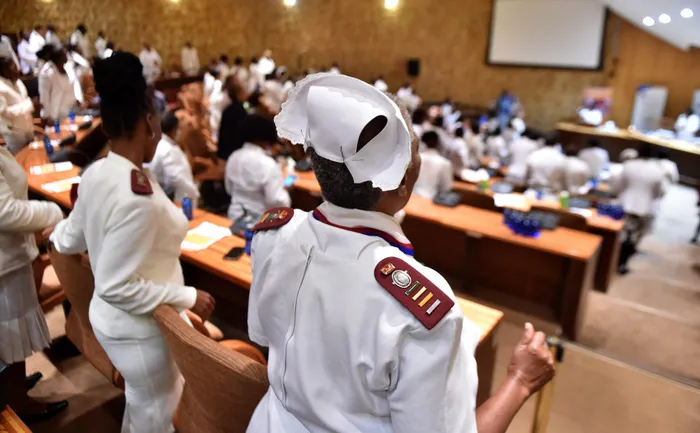International Nurses Day highlights the vital role of nurses and the need for urgent reforms

On International Nurses Day, South Africa celebrates the resilience and dedication of nurses, calling for systemic reforms to ensure a sustainable healthcare future.
Image: Oupa Mokoena Independent Newspapers
South Africa today joins the rest of the world in commemorating International Nurses Day, paying tribute to the vital role of nurses in the healthcare system while spotlighting the growing challenges they face.
Observed annually on May 12 - the birthday of Florence Nightingale, the founder of modern nursing - the day highlights the contributions of nurses to global health and well-being. This year’s theme, “Our Nurses. Our Future. Caring for Nurses Strengthens Economies,” underscores the economic and societal value of investing in the nursing profession.
In a media statement, the National Department of Health praised nurses as the “backbone of any healthcare system,” emphasising their role in providing care, education and support to patients and their families.
However, the department also raised alarm over the safety risks nurses continue to face, particularly in public health facilities. “Nurses continue to face various workplace safety threats on the line of duty, both physically and verbally from patients and community members,” the statement read. “The country has in the recent months and years, experienced disgraceful incidents of heinous acts which involved robbery and sexual assault against nurses, mainly in the primary health facilities.”
To address staffing shortages and improve working conditions, the department announced the planned recruitment of 200 additional nurses “as part of phased implementation of Human Resources for Health Strategy 2030.”
This move aims to “reduce workload and burnout among nursing staff because a well-staffed environment allows for better patient care.”
The department also called on communities, law enforcement and civil society to support safer healthcare facilities, stating, “The department appeals to all stakeholders in the society to join hands with government… to make health facilities safer places for nurses to carry out their duties.”
Meanwhile, the Democratic Nursing Organisation of South Africa (Denosa) marked the occasion with commemorative events across the country, including a national gathering at Grey’s Tertiary Hospital in Pietermaritzburg, KwaZulu-Natal.
In its statement, Denosa emphasised the urgency of structural reforms to address the profession’s systemic challenges. “South Africa is experiencing a critical shortage of nurses, particularly in bedside roles, which has resulted in mounting pressure on those who remain,” it said. The union also criticised the outdated Occupation-Specific Dispensation (OSD) policy, describing it as “insufficient in providing competitive benefits.”
Denosa urged the government to “move beyond symbolic appreciation and towards tangible reforms” to support nurses, including revised deployment systems, updated retention policies, and improved working conditions. “Poor workforce planning continues to leave newly qualified nurses without clear integration pathways into the public health system,” the union said.
Both the Health Department and Denosa aligned on the global significance of the day and the pressing need to support the nursing workforce, especially as the country moves toward Universal Health Coverage under the National Health Insurance (NHI) framework.
“Nurses are central to achieving the United Nations Sustainable Development Goals,” Denosa noted, “particularly Goal 3: Good Health and Well-being, which is inextricably linked to other goals such as No Poverty, Zero Hunger, Quality Education, and Gender Equality.”
As South Africa participates in the global launch of the State of the World’s Nursing 2025 report hosted by the World Health Organization and the International Council of Nurses, both government and union leaders hope the spotlight on nurses today will translate into lasting, meaningful change for those on the frontlines of care.
